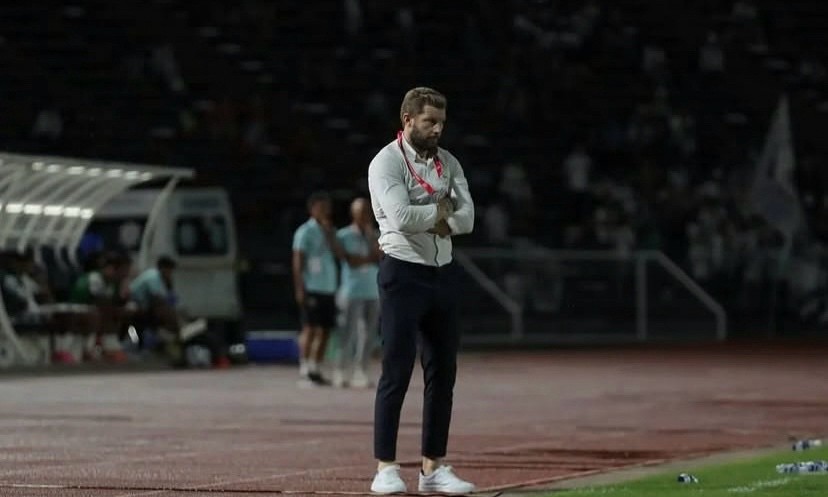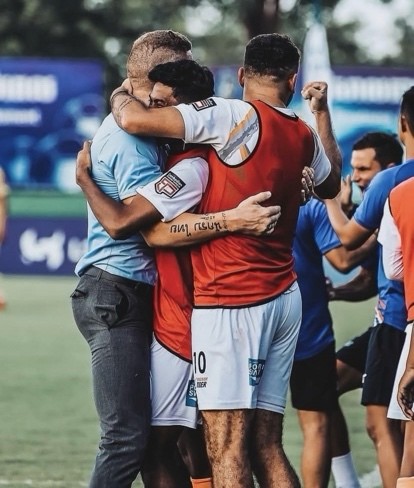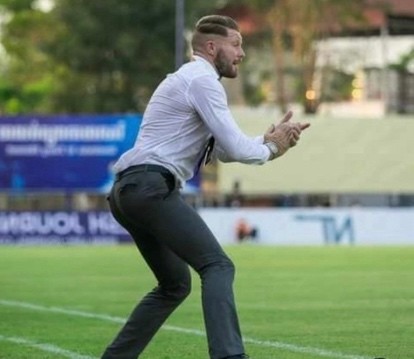One of the best ways to understand how global football really is, is to look at the people working in it. Few careers show the global nature of football better than Alistair Heath’s. After a degree in football studies and cutting his teeth in several professional academies, including Sheffield Wednesday and Birmingham City, he took a chance on a coaching opportunity in South Korea.
Since that first move abroad, Alistair has worked across Thailand, Cambodia - where he led Angkor Tiger in the Cambodian Premier League - and Lithuania.
Alistair’s story highlights the flexibility, risk taking and leadership required to make a name as a football coach today. In this interview, he shares insights from his journey so far as he looks for his next head coaching role, wherever in the world that may be!
The interview has been condensed and lightly edited for grammar and clarity.

[ Getting into coaching ]
Almost as soon as I got introduced to football when I was 4 or 5 and first went to watch Birmingham City, I took great interest in the managers. Of course, I played as well, but for whatever reason, the life of a manager was what caught my eye. When I was a little older, I started playing Football Manager games and all that.
Then, I suppose the first opportunity to do something about it was at 18 when I went to university to do a football studies degree. The first team I ever coached was an under nine’s team - in my head, I was treating it like the Premier League!
[ During the early part of your career you were coaching in both professional academies and in nonleague teams at the same time? ]
After university, I joined the Birmingham City academy. I would have been about 20. For most people, that would have been a great step, but perhaps my mindset was probably a bit detrimental towards my development - I just wanted to go straight into first team football!
When I look back now, being in academy football at that age and stage in my career is a good thing, but I just wanted to skip it and work in a first team environment.
I have always been ultra ambitious and open to doing different things. Even at that age, I would write letters and drive around to clubs and post them through the letterboxes or place them into someone’s hand, saying, ‘I’m available, I want to work in first team football’.
When people ask me about that time, I always say how important it was. At that age, to work with first team players and for my development as a coach, it’s a big thing to work with players older than you and earn their respect.
It was all voluntary, all on my own time and part of the sacrifice that you have to make if you want to be successful. I always consider my experience in non-league to be the most important part of my journey in football.
"I would write letters and drive around to clubs and post them through the letterboxes or place them into someone’s hand, saying, ‘I’m available, I want to work in first team football’"
[ Your first job abroad was in Korea - how did this opportunity come about? ]
I was a PE teacher in junior schools at the time, and I was emailing clubs, trying to get myself out there. I wasn’t looking abroad for jobs, it hadn’t really entered my head, to be honest. Then one day, a call came. I can’t remember exactly who it was, and it was a bit of a shock, but I just knew this was going to be a great opportunity to coach abroad and learn a different culture.
Not once was I hesitant to take it. I thought there had to be value in going abroad. Even though stepping away from English and European football into the unknown felt risky, I knew it could work in my favour.
Looking back, I probably didn’t make the most of that first experience—it almost felt like a trial run for coaching abroad. But it certainly prepared me for what was to come: moving to a country a long way from home and adapting to a completely different culture, environment, and language.
I think people who haven’t worked abroad often don’t realise what it takes to step out of your comfort zone - coaching players with limited English while you barely speak their language, Korean in this case. You still have to develop players, win games, and impress your employers, all while adapting to an entirely new way of life.
[ Shortly after you came back from Korea, you started at Leicester in a unique role working with a Thai team - what was this? ]
The Leicester ownership developed a program where they'd pick 16 to 20 players from Thailand between the ages of 17 and 21. They would come over, do an English program and form a team. We’d train like any team in England trained, four or five times a week and a game. All this would be over a two year window.
During my time there, we worked with three different groups of players. We’d also travel to Thailand for pre-season training and matches, spending roughly 70% of our time in England and 30% in Thailand - scouting players, handling media duties, and building connections.
Overall, it was an incredible opportunity to work in another country and learn a different way of doing things, while also being part of the Leicester academy, where I worked with some really talented players and staff. It was a valuable experience in learning how to coach a variety of footballers.
[ How would you describe the goals of this Thai team inside the Leicester academy? Were they trying to produce players that would play for Leicester, or the national team, or, more cynically, essentially a branding exercise? ]
The aim was to produce players for Leicester if possible, though that didn’t happen. Leicester also owns OH Leuven in Belgium, and one or two players moved there. Most went on to sign for top teams in Thailand, and a few even represented the national team. Ultimately, the goal was to help players reach the highest level they could and give them the experience of living in a different country.
Once COVID hit, the program had to stop. It was a shame we couldn’t continue for a few more years, but I also had the chance to work within the academy during that time, including with players who went on to make it into Leicester’s first team.
[ How did you make the decision to leave Leicester for Angkor Tiger and Cambodia? ]
At Leicester, at the time, I felt there was no real pathway for me to progress through the club. I didn’t see how I was going to progress in England - and maybe I could have held on a little bit more but then I got this opportunity in the Cambodian Premier League. I had a relationship with an agency in Singapore and they called one day saying, ‘we’ve got this club that’s looking for a manager’.
I knew very little about the country and the football. I knew it was going to be difficult, but as I learned in South Korea, you don’t really find out until you actually take the opportunity and experience things on the ground.
So, my two choices at the time were to stay at Leicester, a great club with great training facilities and great players - but it would be an easy, comfortable zone - or take the chance to go and be a manager in a first team environment, in Cambodia. And the latter was obviously the choice I took!

"you don’t really find out until you actually take the opportunity and experience things on the ground"
[ What is something you learned from this experience in the Cambodian Premier League? ]
In those two years of management, I felt like I learned 10 years’ worth of knowledge!
Listen, I went into it thinking I know it all, and you don't, you never will. I look back on some of my first interviews and it’s embarrassing! But I was talking from a place of ambition - and I still am. There have been so many positives, but also things you look back on and think I should have done that differently.
As a manager in a foreign country, it’s really important to have some of your own network around you, because one thing I’m sure any manager will tell you, it can be a very lonely place.
You’re always going to make mistakes, luckily I’ve learned from them and am in a much better position hopefully, going into the next role.

[ At the start of the year, you were briefly part of the coaching team at a club in the Lithuanian second division? ]
Yeah, sometimes things just don't pan out like you thought! I think there's a big strength in being able to say, ‘actually, this doesn't feel right’. You know, I could have just said, ‘it feels great,’ but actually it just didn’t work out. The club was great and I can’t say a bad word about them, but for one or two reasons, it didn’t feel right.
I enjoyed seeing the country, another culture and the different players and their abilities. But, ultimately, I thought for me and my career, I didn’t feel that I could add the value I wanted there. So, we decided it was best to just move on.
[ Why do you think more coaches aren’t following career paths like you? ]
I don't really know. I was talking to someone about this topic the other day, and a lot of what I've done hasn't been ‘planned’ or ‘chosen’. I don’t have a piece of paper where I’ve written down my plans! I’ve just had some opportunities and I’ve gone with them.
And look, it would have been really easy to stay at Leicester - that was 4 years ago - and who knows what would have happened. I might have been promoted, maybe they would have gotten rid of me, maybe I’d have another opportunity in England.
I’m always looking to take an opportunity that I think is going to progress me. I’m not looking to stay and just coast through.
When I started in football at 18, I knew where I wanted to be and I’ve taken a different route now, a more unique path. It doesn’t mean it’s going to work, but my hope is that the ‘uniqueness’ will pay off!
[ Do you think that it’s coaches in general who are less open to these opportunities or British coaches specifically (or ‘more’)? ]
I would say, if you're a coach and a manager, you want to be in the best leagues. You want to be in the best football environment, and right now, that’s England, isn’t it? So I get why people want to stay here and build their careers here.
Maybe if I’d stayed at Birmingham City or Leicester longer, I might have been in the right place at the right time and been in a different situation.
I think there’s probably a bias or a perception in England and other European countries that it’s a lower level of football in Asia, and you’re not recognized as much. So there’s definitely a temptation to stay in England and the countries with the top leagues.
[ Do you think with more development and exchange (‘globalization’ if you will) football will begin to ‘balance out’ around the world? e.g. will the Premier League in 2050 or 2075 have Cambodian or Thai players? Or is the gap too wide to catch up? ]
I don't think it's impossible, but I don't think it will. There’s a big gap in terms of knowledge and skill acquisition. Thailand and Cambodia are both countries that are nuts about football and have good footballers, but I don’t see how that gap can be bridged.
Some of it is perception - there are so many other countries you can go to to find a player and I think it’s easy to stick to existing perceptions. Really, you would need many people to go to a place and start to really bang the drum for the players there.
When I was Angkor Tiger manager, I brought a 15 year old from the academy into the first team. He was great and needed a chance. I thought I could pick up the phone to, say, Leicester and go, ‘I think you need to look at this kid, he’s 15, playing in the first team and he’s got something’ - but the reality is, that wouldn’t happen. It would require a bigger mindset shift.
"there are so many other countries you can go to to find a player and I think it’s easy to stick to existing perceptions"
[ You started thinking about coaching at a young age and have been involved in the game for ~20 years now. How have your thoughts about football changed over time? ]
Football's a tough environment!
I love it just as much and I have a much better belief in myself that I can be successful, but it’s a tough industry. You’ve got to be hard and make tough decisions. Over time, I’ve learned that no one gives you anything and you have to make it happen for yourself.
But, I still have that love and desire I had when I first started. I don’t at all regret going to take that course at Derby University. I’m really proud of where I’ve come from and have learned a lot about myself and the world of football.

[ Do you think there are more or less opportunities for aspiring or young coaches now compared to when you started? ]
I think there are more opportunities, but there are also more coaches. Now, there are more opportunities abroad, especially in the Middle East and Asia - though, maybe not with clubs. And, as we just talked about, when you go away, it’s very difficult to get back in England, where the opportunities are limited - and not the best paid either.
So, for any coach coming through, I think it’s important to know that there’s going to be a lot of sacrifices and risks required to get that ‘lucky break’, which doesn’t come around all that much!
[ How are you going about finding your next role? ]
It's been difficult to find that next role. There have been some interviews and talks with different clubs that haven’t worked out for various reasons.
I think my next role will be abroad again, and I’m very eager to take that next step and use what I’ve learned in Cambodia and Lithuania. I’m excited about the next challenge - ideally, I’d have been in it by now. As the new season is starting, it’s very frustrating to be looking on from afar.
I’m always open as long as the project aligns with the club and I - it’s a two way thing.
